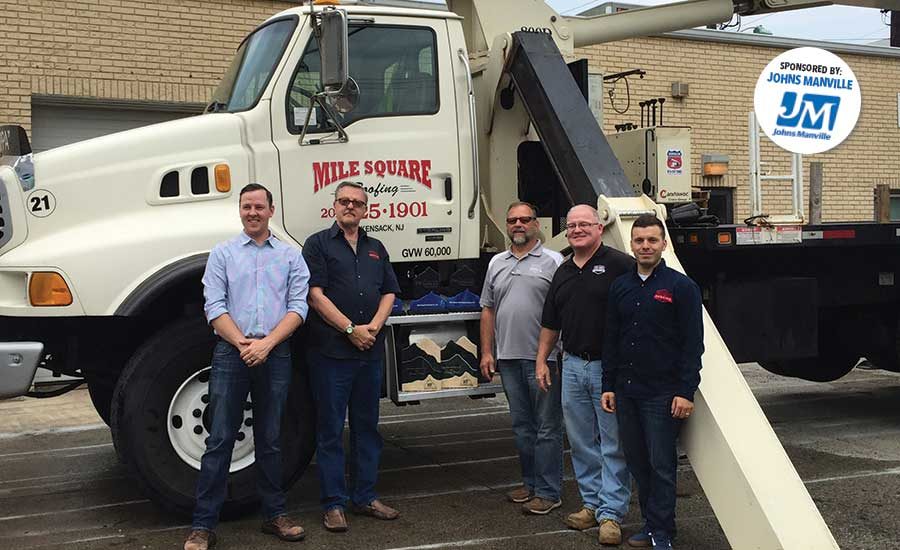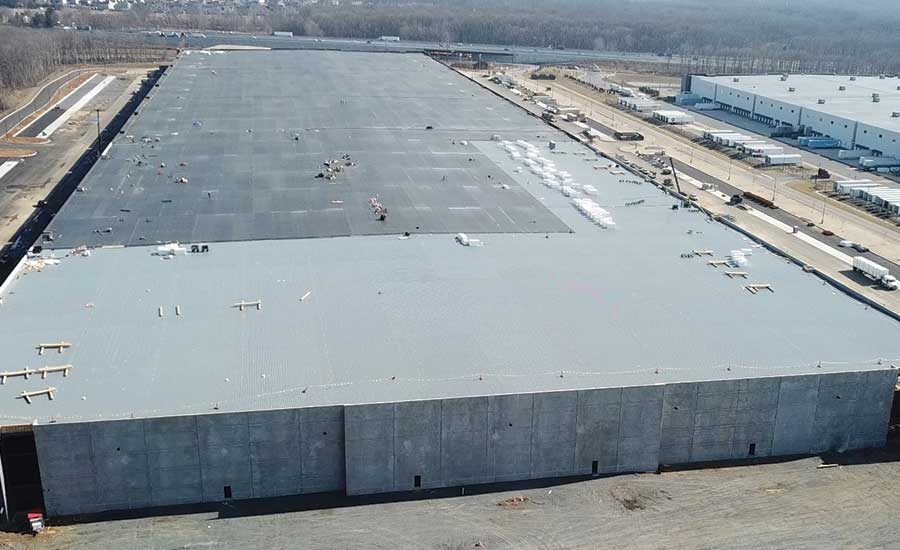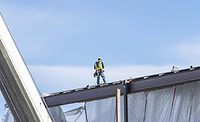Contractor Profile: Mile Square Roofing Co., Inc.
This Extended Roofing Family Provides High-Quality Roof Installations and Maintenance in a Highly-Professional Manner

Mile Square Roofing Co., Inc. is led by a veteran executive team that includes (from left) Tim Wyka, Stan Wyka, Kirk Hollis, John Buckley and Oscar Orozco. The group is pictured in front of their Hackensack, N.J., headquarters and a collection of their Pinnacle Award plaques. Photos courtesy of Mile Square Roofing Co., Inc.

“We have a customer base that demands quality and it is the lifeblood of our business,” said Tim Wyka, vice president of Mile Square Roofing Co., Inc. “Without it we would not have the reputation we have worked so hard to cultivate and our business would not grow. We have never put profits before quality and I think that has gone a long way in helping us succeed as a company.”

“We have a customer base that demands quality and it is the lifeblood of our business,” said Tim Wyka, vice president of Mile Square Roofing Co., Inc. “Without it we would not have the reputation we have worked so hard to cultivate and our business would not grow. We have never put profits before quality and I think that has gone a long way in helping us succeed as a company.”



Being a commercial roofing contractor in a competitive market like the tri-state area surrounding New York City isn’t easy. There’s a lot of available work, but with more and more out of state contractors coming into New Jersey, Tim Wyka, vice president of Mile Square Roofing Co., Inc., feels like he’s always got to be on top of his game. Costs are high and expenses can begin to pile up and strangle profit margins. Finding an equilibrium to succeed is a challenge and often takes a team — or a family — to get the important things done.
That’s how they’ve done it at Mile Square Roofing Co. for more than 30 years, and that’s how the Wykas hope to be doing it 30 years from now and longer.
Based in Hackensack, Mile Square Roofing has roughly 60 employees that do commercial, industrial and institutional roofing. The majority of business is centered around reroofing projects, but crews take on work of all sizes from small patch repairs to massive warehouse roof installations.
Wyka said the company’s specialty is large commercial warehouses, but they’ve taken on jobs of all scopes and sizes from hospitals to high rises, office buildings to condominiums, distribution centers to strip malls and everything in between.
“Our projects are not particularly flashy but they are important to our customers and we treat them as such,” Wyka said.
Always Roofing
Mile Square Roofing didn’t launch until 1984, but roofing was always in the Wyka’s blood. Tim’s father, Stan, and grandfather and great grandfather were roofers. In his youth, Stan used to work for them, doing mostly hot tar applications.
Upon the birth of his daughter in 1983, Wyka decided to venture out and started his own roofing company a year later. They were hardly glory days. Wyka worked out of his apartment running a crew during the day, doing takeoffs in the afternoon and estimating at night.
He started out with one truck, three kids and a desk in the corner of his apartment and grew the company over many years. Growing up in and around the yard, Tim Wyka said that he didn’t always have his sights set on a roofing career. However, as he got older he said he began to appreciate what his family, and father in particular, had built from virtually scratch.
As the company consistently continued to surpass revenue projections by the mid 2000s, the elder Wyka surrounded himself with a knowledgeable and visionary team that could take Mile Square Roofing to another level.
“As I got close to graduating college I knew I wanted to be a part of that growth,” Tim Wyka explained. “I joined him in 2008 and set to work learning the ins and outs of commercial roofing.”
The younger Wyka was tasked with starting a proper service department to compliment the reroofing work that was their bread-and-butter. He said the experience was beneficial for him personally and professionally. As a service manager, he got to learn the industry and intricacies of the roofing business through hands-on work. It also placed him face-to-face with Mile Square’s customers, with whom he’s developed his own relationships with.
“My time as service manager has proved invaluable to me as I have continued to grow with the company,” he said. “Today, I help my father run our daily operations, estimate, project manage and do whatever else I need to help insure the success of our company.”
An Extended Family
The roofing department still takes priority in scope and revenue (roughly 80 percent), Wyka said. However, the opportunity for growth in maintenance in the bustling tri-state construction market is something they take seriously. When it was time for the younger Wyka to move upward in the organization and focus on estimating, he lobbied for an unconventional choice to replace him.
Oscar Orozco was born and raised in Columbia and emigrated to America in the early 2000s. He joined Mile Square about a decade ago as a helper on one of their roofing crews. Though he lacked experience, Orozco showed a tremendous work ethic and was a quick study. He started as a mechanic and worked his way to service foreman, where he excelled. Though relatively inexperienced for the management role, the intangible skills he consistently demonstrated made Wyka take notice.
“He did not have a lot of experience with office work, but he had many other valuable qualities that led us to give him a shot,” Wyka said. “He has spent every day since proving us right in that decision. He has taken our service department to the next level and his customer service is second to none.”
Rewarding Orozco for his performance and contributions to the company is just one example of how Mile Square incorporates a family feel into how they operate. Ildefonso Torres started with the company more than 20 years ago and brought both his brothers to the company. They’re all valuable members of the team, and the extended family.
“We have various sets of brothers, fathers and sons, nieces and nephews that work throughout the company,” Wyka said. “We want everyone to feel that their family is a part of our family.”
Treating them like valued family members means keeping them accountable for work performance and jobsite safety.
Mile Square implemented a comprehensive safety program that includes weekly safety meetings, toolbox talks and jobsite inspections. Foreman also lead in-house training workshops on rainy days, with the idea to continually invest time into the employees and groom them for career progression within the company. The investment helps not only with quality control on the roof, but worker retention overall, Wyka said.
That’s important when you’ve built a reputation on high-quality work and customer service.
“We train all our men from the ground up to ensure a level of workmanship that is very high,” he explained. “Nothing is marked completed until it is inspected thoroughly and if mistakes are made we correct them immediately.”
Navigating the Storm
Maintaining a stellar reputation in roofing means operating consistently at all levels, particularly at challenging times due to economic conditions or Mother Nature. Wyka said that the aftermath of Hurricane Sandy in 2012 proved to be a particularly hard time for the company since the damage was so swift and broad. Not only was the work demand taxing, but many employees were personally affected by the storm, which to date is the fourth costliest hurricane in American history at nearly $69 billion in damage.
“It was difficult to handle the sheer volume of calls that came in for both the roofing and service side,” Wyka said. “We had to organize a lot of emergency repairs on buildings all over the state, all while being without electricity at our shop and having a gas shortage for our vehicles and equipment. Many of our employees where dealing with their own storm related damage and outages that made it difficult to mobilize at first.”
Much like it did to overcome the Great Recession of 2008, Mile Square’s consistent sales and adaptability kept the company moving. When work in certain areas dried up, salesmen widened the territory. Wyka said they also value-engineered projects when they could and made a consistent effort to gain new customers through the service department. The combined efforts allowed them to weather the storm.
Wyka is also quick to credit three important rules he learned and adopted from his roofing predecessors, and father, in particular:
Always do what is right for the customer even if it hurts the bottom line. A good reputation can go along way with driving future business.
The men in the field are the most important asset you have. They are the front line to your customers and can make or break your business. Investing in them will yield the largest returns.
Do not take on more work than you can handle.
“It’s better to turn a job away than to underperform,” he said. “In the first instance the customer may or may not invite you to the next bid, but in the latter you can be sure that they will not.”
Looking for a reprint of this article?
From high-res PDFs to custom plaques, order your copy today!









